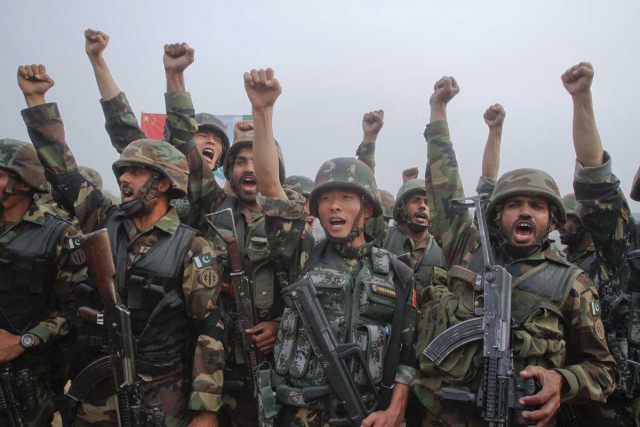China may establish military base in Pakistan: Pentagon report
US believes other locations for new Chinese military bases include Middle East, Southeast Asia, and western Pacific

Soldiers from Pakistan and China at a joint military exercise in Jhelum, Punjab, in November 2011. PHOTO: REUTERS
Beijing currently has just one overseas military base, in Djibouti, but is believed to be planning others, including possibly Pakistan, as it seeks to project itself as a global superpower.
"China's advancement of projects such as the 'One Belt, One Road' Initiative (OBOR) will probably drive military overseas basing through a perceived need to provide security for OBOR projects," the Pentagon said in its annual report to Congress on Chinese military and security developments.
"China will seek to establish additional military bases in countries with which it has a longstanding friendly relationship and similar strategic interests, such as Pakistan, and in which there is a precedent for hosting foreign militaries," the report said.
PM Imran rounds off China visit with a raft of accords
That effort could be constrained by other countries' wariness of hosting a full-time presence of the People's Liberation Army, the report noted.
But target locations for military basing could include the Middle East, Southeast Asia, and the western Pacific. China has already established well-armed outposts on contested atolls it build up in the South China Sea.
Last year, there were reportedly discussions on a base in the Wakhan corridor of northwest Afghanistan.
In addition, The Washington Post recently identified an outpost hosting many Chinese troops in eastern Tajikistan, near the strategic junction of the Wakhan Corridor, China, and Pakistan.
Chinese President Xi Jinping has sought to project the country's power beyond its immediate "back yard" in East and Southeast Asia.
This includes strengthening the country's presence in international institutions, acquiring top-flight technology and establishing a strong economic presence worldwide.
It also includes projecting the country's military force on land, sea and in space, the report notes.
"China's leaders are leveraging China's growing economic, diplomatic, and military clout to establish regional preeminence and expand the country's international influence," the report said.
Beijing in particular increasingly sees the United States as becoming more confrontational in an effort to contain China's expanding power, it said.
Beijing, meanwhile, has taken note of a growing suspicion in many countries of the One Belt One Road program, and has toned down its aggressive rhetoric in response.
Nevertheless, the Pentagon said Beijing's leadership has not altered its fundamental strategic goals.



















COMMENTS
Comments are moderated and generally will be posted if they are on-topic and not abusive.
For more information, please see our Comments FAQ